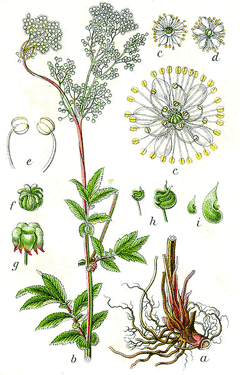MATERIA MEDICA: MEADOWSWEET
Latin Name:
Filipendula ulmaria Family:
Asteraceae (Sunflower Family)
Part used: Aboveground Plant
Energetics: Bitter, sweet, cool, dry
Actions: Analgesic, anodyne, antacid, antibacterial, antiemetic, anti-inflammatory, antispasmodic, aromatic, astringent, diaphoretic, diuretic, sedative, stomachic, urinary antiseptic..
Uses:
- Arteriosclerosis
- Arthritis
- Cellulitis
- Diarrhea
- Edema
- Fever
- Flu
- Heartburn
- Inflammation
- Prostate Enlargement
- Urinary Tract Infection
- Vaginitis
Preparation and Dosage Tea – 4-5 grams of ground parts steeped in boiling water for 10 minutes, several times a day. Tincture – 2-4 mL, 3x per day.
Safety considerations: Avoid this herb if you have: -known allergies or hypersensitivity to salicylates -known allergies or hypersensitivity to meadowsweet (or other members of the Roseaceae family). -Meadowsweet an also exacerbate asthma. This may occur due to the presence of aspirin triad which is a common occurrence of asthma, rhinitis and aspirin allergy.




